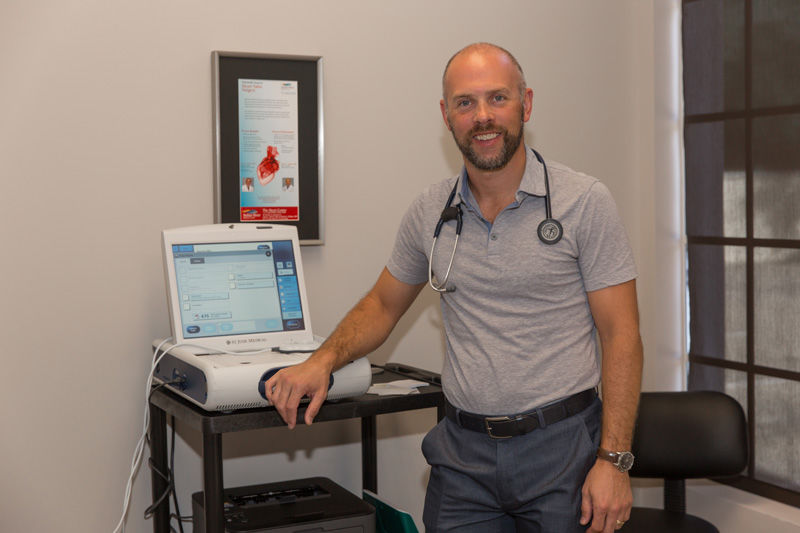Starting this month, the Indian River Medical Center will become the first hospital in the state of Florida to add “MediGuide” technology to its heart care regimen at its new, state-of-the-art electrophysiology lab. The software provides three-dimensional video-like views of the heart muscle in action with much less radiation than previous systems.
Dr. Brett Faulknier will lead the electrophysiology lab, where Medi- Guide technology will be one of many tools for diagnosing and treating heart conditions.
So, just what is “electrophysiology” and why should you care?
You should care – if you have a heart – because electrophysiology may be what helps keep that heart beating properly as you grow older.
A human heart beat is a muscle contraction and every one of those contractions begins when an electrical signal is sent from the heart’s sinoatrial node in the upper right chamber. Those signals move, cell-by-cell, throughout the rest of the heart muscle, making it pump blood to the entire body.
But irregular heartbeats – or arrhythmias – says the American Heart Association, can cause the heart to beat too fast or too slow or in an irregular manner and that can lead to problems that range from the merely bothersome to the downright lethal.
Deadly blood clots, sudden cardiac arrest and strokes can all be brought on by various forms of arrhythmia.
Faulknier, a fellow of both the American College of Cardiology and the Heart Rhythm Society, uses a more down-home analogy to describe the problem.
“Just imagine your house,” says Faulknier. “Electricity is coming into the breaker box. When the electricity goes there, it’s supposed to leave and go out to the rest of the house nice and smoothly. With arrhythmias, however, that electricity can get stuck in the breaker box and begin to spin around in a circle, and it’s at that point where the heart goes very fast,” or far too slow.
Electrophysiology can trace the source of various arrhythmias and help doctors decide on the best course of treatment. In many cases, it can even “cure” or fix electrical roadblocks inside the heart.
According to Baltimore’s Johns Hopkins Medical Center, “During an EP study, small, thin wire electrodes are put into a vein in the groin.
“The wire electrodes are [then] threaded through the vein and into the heart, using a special type of X-ray ‘movie,’ called a fluoroscopy.
“Once in the heart, the heart’s electrical signals are picked up by the electrodes and measured. Electrical signals are also sent through the electrodes to stimulate the heart tissue to try to cause the abnormal heart rhythm so that it can be evaluated and its cause can be found.”
The most commonly seen type of arrhythmia is atrial fibrillation, which, Faulknier says, “is more common in the older population. I’ve been telling a lot of people atrial fibrillation is like arthritis of your heart. As we get older the heart gets a little stiffer. You can image your knees get stiff and get a little creaky, well, so does the heart.”
While basic EP studies have been performed for nearly two decades, the new twist in this story is the introduction of the MediGuide software from St. Jude Medical, a global medical device manufacturer.
Training on this new software recently took Faulknier to Montreal, where, he says, he “worked with a world renowned electrophysiologist, Dr. Bernard Thibault, at the Montreal Institute of Cardiology.”
Faulknier says the software is so new, there are only a limited number of places where training is available.
“I was able to work that with Dr. Thibault in a special research laboratory where they have an entire lab set up and was able to do live scenarios where I utilized the equipment,” Faulknier says.
For IRMC, already a two-time winner of the American College of Cardiology’s “Platinum” performance award, the new electrophysiology lab is an important new asset. Pacemakers, implantable cardioverter defibrillators and prescription drugs are other tools doctors in the lab will employ.
Those experiencing symptoms such as dizziness, lightheadedness, fainting or heart palpitations should immediately consult their physician or cardiologist, who may well send them to Dr. Faulknier for an EP study right here in Vero Beach.

